上海版牛津英语六年级上unit1 unit2课本解析
牛津上海版英语六年级上学期教材梳理及练习 Unit1
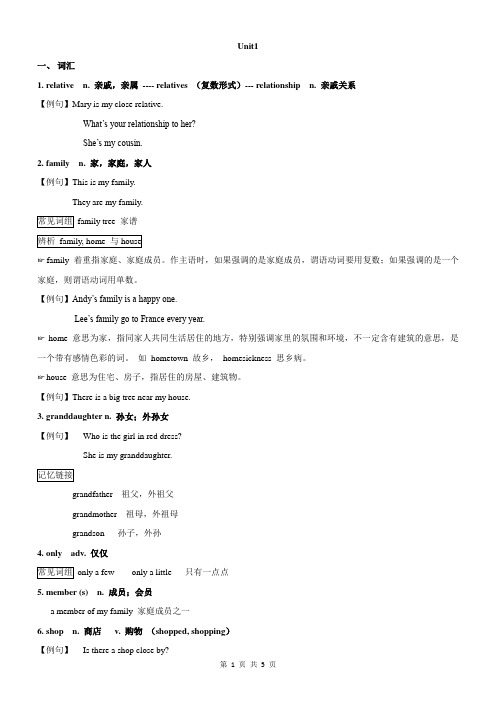
Unit1一、词汇1.relative n. 亲戚,亲属---- relatives (复数形式)--- relationship n. 亲戚关系【例句】Mary is my close relative.--- What’s your relationship to her?--- She’s my cousin.2.family n. 家,家庭,家人【例句】This is my family.They are my family.family tree 家谱☞ family 着重指家庭、家庭成员。
作主语时,如果强调的是家庭成员,谓语动词要用复数;如果强调的是一个家庭,则谓语动词用单数。
【例句】Andy’s family is a happy one.Lee’s family go to France every year.☞home 意思为家,指同家人共同生活居住的地方,特别强调家里的氛围和环境,不一定含有建筑的意思,是一个带有感情色彩的词。
如hometown 故乡,homesickness 思乡病。
☞ house 意思为住宅、房子,指居住的房屋、建筑物。
【例句】There is a big tree near my house.3. granddaughter n. 孙女;外孙女【例句】--- Who is the girl in red dress?--- She is my granddaughter.grandfather 祖父,外祖父grandmother 祖母,外祖母grandson 孙子,外孙4. only adv. 仅仅only a few only a little 只有一点点5. member (s) n. 成员;会员a member of my family 家庭成员之一6. shop n. 商店v. 购物(shopped, shopping)【例句】--- Is there a shop close by?--- Yes, there is a big shop on the right.--- I want to go shopping tomorrow.--- I’ll go with you.bookshop 书店shopping bag 购物袋shopping centre 购物中心shopping mall 大型购物商场go shopping 去购物= do some shopping 【例句】I have to go shopping this afternoon.= I have to do some shopping this afternoon. 7. else adv. 别的,其他的【例句】--- What else do you want?--- Nothing else, thank you.someone/anybody/nobody elsenothing/something/anything elsewho elsewhere elsewhat else?who else? 强调还有什么/谁...?8. badminton n. 羽毛球【例句】Tom likes playing badminton.play + 球类运动【例如】play tennis 打网球play table tennis 打乒乓球play football 踢足球play volleyball 打排球9. cycle n. 自行车v. 骑自行车【例句】They want to go there by cycle.He cycles to work every day.cycle 作名词时还有周期、循环的意思。
上海版牛津英语小学六年级上unit1 unit2课本解析

精心整理1.Alicehasgotalotofpresentsandbirthdaycardsfromherfamilyandrelatives.(1)...have?got...?I?think?I?have?got?one.现在完成时结构have?got在口语中相当于一般现在时have的意义,表示“有”。
不过,在美国英语中常用have,而在英国英语中则常用have?got。
?他有一个兄弟。
.(美式)??◆◆Have?/Has...???你有一把雨伞吗??①????注?意?①—??—Yes,I?have./No,I?haven't.?②—??—Yes,I?do./No,Idon't.??考点链接?1.Do?you?have?a?motorbike?(同义句)→????you?????a?motorbike??2.I?don't?have?a?mobile?phone?like?that.→I?????a?mobile?phone?like?that.?(2)alotof=lotsof+可数名词复数/不可数名词Ihavealotoffriends.=Ihavelotsoffriends.Thereisalotofwaterintheglass.=Thereislotsofwaterintheglass.(3)介词from2.Howmanyunclesdoyouhave?Howmany+可数名词复数+do/does+主语+have(howmany在句首,名词复数跟着走)Howmany的用法:1)therebe如果只能接Howmany+可数名词复数+arethere+Thereisabookonthedesk.Howmanybooksarethereonthedesk? Therearesevendaysinaweek.Howmanydaysarethereinaweek?Howmuch的用法:12)3)4)询问数字计算的结果,相当于what.Howmuchisthreeplusone?1.____________?meatdoyoueateveryweek?2.____________studentsarethereinyourclass?3.________?the?pants??They’re?15?yuan.?A.How?many?is????????????????B.How?many?are????C.How?much?is????????????????D.How?much?are3.Iusuallygoshoppingwithmyaunt.(1)always总是usually通常often经常sometimes有时候never从不表示频率,在句中可看做是插入语。
牛津沪教版六年级上6AUnit1-Unit2重要知识点复习
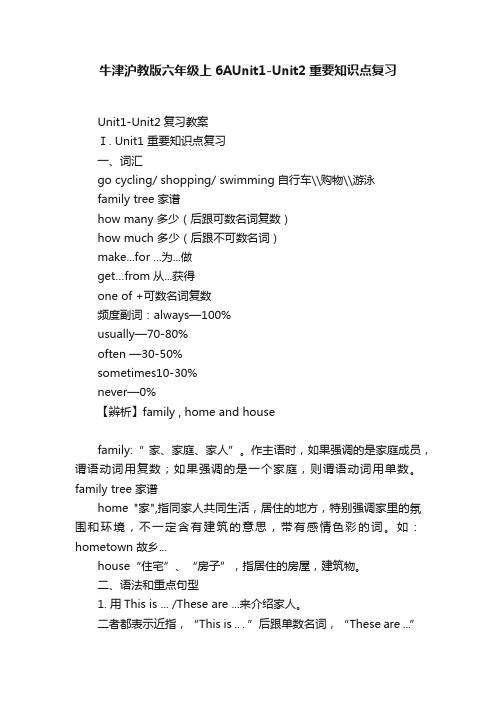
牛津沪教版六年级上6AUnit1-Unit2重要知识点复习Unit1-Unit2复习教案Ⅰ. Unit1 重要知识点复习一、词汇go cycling/ shopping/ swimming自行车\\购物\\游泳family tree 家谱how many 多少(后跟可数名词复数)how much 多少(后跟不可数名词)make...for ...为...做get…from从...获得one of +可数名词复数频度副词:always—100%usually—70-80%often —30-50%sometimes10-30%never—0%【辨析】family , home and housefamily:“ 家、家庭、家人”。
作主语时,如果强调的是家庭成员,谓语动词用复数;如果强调的是一个家庭,则谓语动词用单数。
family tree 家谱home "家",指同家人共同生活,居住的地方,特别强调家里的氛围和环境,不一定含有建筑的意思,带有感情色彩的词。
如:hometown 故乡...house“住宅”、“房子”,指居住的房屋,建筑物。
二、语法和重点句型1. 用This is ... /These are ...来介绍家人。
二者都表示近指,“This is .. . ”后跟单数名词,“These are ...”后跟复数名词或者多个不同的对象。
2.用how many 来询问数量后接可数名词的复数形式,当我们提问你有多少……时候,如果How many后跟人,常用how many... do you have?如果How many 后跟物,常用how many...have you got?3.What do you do with your... ? 和What else do you do with your... ? 来提问与家庭成员或亲戚一起做什么.else 意为别的其他的,常用于特殊疑问词或不定式之后,如what else, something else等。
牛津沪教版六年级上6AUnit1-Unit2 重要知识点复习
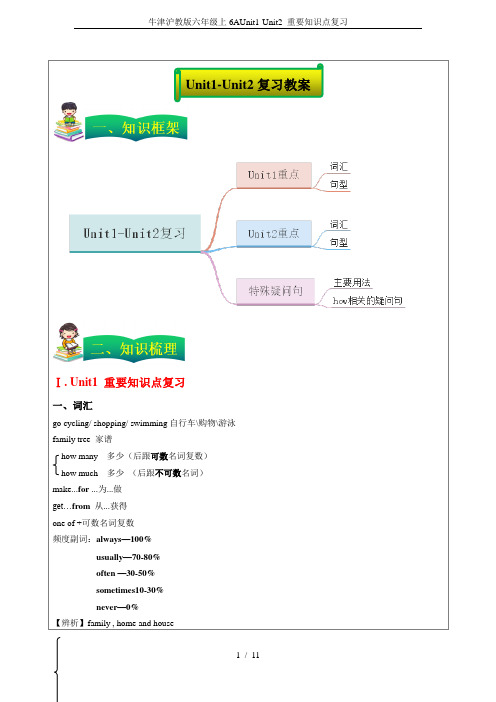
Unit1-Unit2复习教案Ⅰ. Unit1 重要知识点复习一、词汇go cycling/ shopping/ swimming自行车\购物\游泳family tree 家谱how many 多少(后跟可数名词复数)how much 多少(后跟不可数名词)make...for ...为...做get…from从...获得one of +可数名词复数频度副词:always—100%usually—70-80%often —30-50%sometimes10-30%never—0%【辨析】family , home and housefamily:“ 家、家庭、家人”。
作主语时,如果强调的是家庭成员,谓语动词用复数;如果强调的是一个家庭,则谓语动词用单数。
family tree 家谱home "家",指同家人共同生活,居住的地方,特别强调家里的氛围和环境,不一定含有建筑的意思,带有感情色彩的词。
如:hometown 故乡...house“住宅”、“房子”,指居住的房屋,建筑物。
二、语法和重点句型1. 用This is ... /These are ...来介绍家人。
二者都表示近指,“This is .. . ”后跟单数名词,“These are ...” 后跟复数名词或者多个不同的对象。
2.用how many 来询问数量后接可数名词的复数形式,当我们提问你有多少……时候,如果How many后跟人,常用how many... do you have?如果How many 后跟物,常用how many...have you got?3.What do you do with your... ? 和What else do you do with your... ? 来提问与家庭成员或亲戚一起做什么.else 意为别的其他的,常用于特殊疑问词或不定式之后,如what else, something else等。
牛津沪教版英语六上Unit1-Unit12全册课件-附教学设计

y
easy very happy
1. 课后的练习题 2. 用本节课所学的单词和句型向别人介绍 你的同桌或者你的朋友
Module 1 Getting to know each other
Unit 2 My summer
holiday
famous
countryside
everyone
during spend
How was your holiday?
great gym brother
museum\ classmatபைடு நூலகம்s
library\ family
用学到的句型与家人、 朋友谈论假期过得如何。
Module 1 Getting to know each other
Unit 3 Healthy or unhealthy?
Yes, I did. I played chess with him in my home.
Did you go to beach last weekend? …
… Yes, I did.
用学到的句型与家人、 朋友交谈。
5 Unit 5 Animals in danger
What’s your favourite animal?
That’s healthy.
A: What did you have for breakfast this morning? B: I had... A: That’s healthy.\ That’s not healthy. You should...
A
What did you have for breakfast this morning?
I had one hamburger and some cola.
Unit2课件牛津上海版英语六年级上学期

Two. • be friendly to sb.=be kind to sb. • 对……友好 • be friendly with sb.和某人关系好
9
单词解析
词组解析
语法夯实
• 【知识拓展】 • friendly常ly to sb.的意思是“对某人友好”或“对某人
11
单词解析
词组解析
语法夯实
For example
Would you be kind to help me?
n. 种类
I like all kinds of fruit.
12
单词解析
词组解析
语法夯实
For example
1) 淘气的 He is a naughty boy. 2) (用隐晦的低级语言) 刺激人的,低级的
• 【辨析】almost 可以与no, none, never以及 • nothing等不定代词连用,而nearly则不可 • nearly 在not的否定句中,而almost 不可以。 • She is not nearly as pretty as her sister.
3
单词解析
词组解析
语法夯实
6
【中考链接】用括号中所给单词的适当形式填空。
• Some people like reading on Wechat, but ____ don’t. (other)
牛津英语上海版六年级第一学期课件 Module 1 Unit 2 Period 4 (ok)

11-3
Earth. Let’s read it to know more
about Friends of the Earth.
1 2 3 4 5 6 7 8 9 10 11
11-4
1 2 3 4 5 6 7 8 9 10 11
11-5 Chapter 1 What is Friends of the Earth
sea
plants
land // air
1 2 3 4 5 6 7 8 9 10 11
animals
people
11-9 is all the things round us.
1 2 3 4 5 6 7 8 9 10 11
Is our
dirty or clean?
Our environment is dirty now because there is a lot of pollution. //
Write
• Is our Earth dirty or clean? • What do some people do to our Earth? • Do they make it clean or make it dirty? • What must we do to look after the
who can HELP me?
Earth //
1 2 3 4 5 6 7 8 9 10 11
We can help you
11-2
because we are
FRIENDS OF THE EARTH.
1 2 3 4 5 6 7 8 9 10 11
This is a book about Friends of the
沪教牛津版六年级上册英语全册教案(含单元知识点总结)
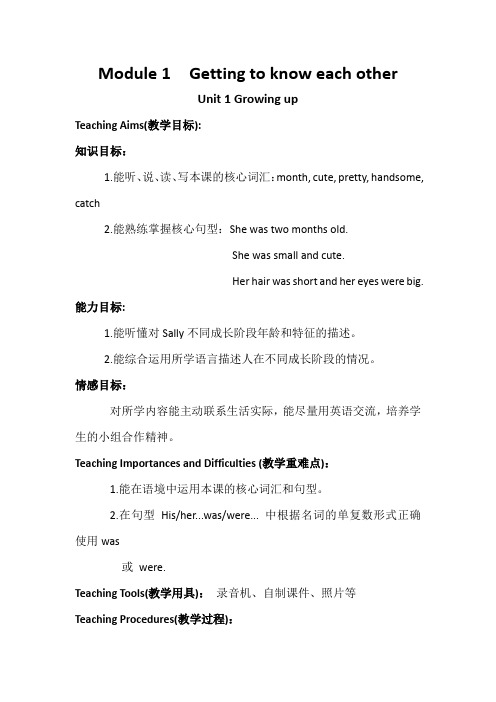
Module 1 Getting to know each otherUnit 1 Growing upTeaching Aims(教学目标):知识目标:1.能听、说、读、写本课的核心词汇:month, cute, pretty, handsome, catch2.能熟练掌握核心句型:She was two months old.She was small and cute.Her hair was short and her eyes were big.能力目标:1.能听懂对Sally不同成长阶段年龄和特征的描述。
2.能综合运用所学语言描述人在不同成长阶段的情况。
情感目标:对所学内容能主动联系生活实际,能尽量用英语交流,培养学生的小组合作精神。
Teaching Importances and Difficulties (教学重难点):1.能在语境中运用本课的核心词汇和句型。
2.在句型His/her...was/were... 中根据名词的单复数形式正确使用was或were.Teaching Tools(教学用具):录音机、自制课件、照片等Teaching Procedures(教学过程):StepⅠ.Warm up and revision(热身与复习)1. Greetings.2. Do some warming-up exercises.3. Review the numbers.Step Ⅱ.Presentation and practice(呈现新语言知识和练习)1. Lead in.T: How old are you?S1: I’m eleven years oldT: You’ll be twelve years old next year. You’re growing up.2. Show some photos and introduce the new words.3. Learn to say and use the words.4. Talk about the photos of Sally.5. Watch the screen and learn to say the sentences.6. Ask pupils to practise in groups.Sept Ⅲ. Learn the story (学习课文)1. Read the story and learn to say the useful sentences.2. Watch the cartoon.Module 1 Getting to know each otherUnit 2 My summer holidayTeaching Aims(教学目标):1.能听、说、读、写本课的核心词汇:famous, during, spend, everyone,countryside2.能熟练掌握核心句型:How was your summer holiday?It was wonderful. We went to the Great Wall.Everyone had a good time.3.读懂有关暑假生活的对话,学会询问别人和介绍自己的暑假生活。
上海牛津英语六年级 上下册全知识点梳理

上海牛津英语六年级上下册全知识点梳理-CAL-FENGHAI.-(YICAI)-Company One1上海牛津英语六年级上下册全知识点梳理频度副词always/sometimes/usually/never 是频度副词,提问应该要用How often?在句中的位置是:放在行为动词的前面,放在be动词的后面。
也可以说“行前系后”。
E.g She is always kind.她总是很善良的。
She always helps other people.她总是帮助其他人。
不能出现这样的句子:She is always helps other people.(×)一句话中不能同时出现两个动词。
并且要注意主谓保持一致,尤其注意第三人称单数不可以忽略。
how often 与 how many timeshow often 提问“频率次数+时间范围”how many times 提问“频率次数”e.g. —How often do you exercise —Twice a week.—How many times have you been there —Twice.副词表示动作特征或性状特征。
一般用来形容或修饰除了名词和代词以外的词,主要修饰形容词、动词、其他副词和句子。
He looks very happy.(修饰形容词)The old lady is walking slowly now.(修饰动词)Luckily, he got the first prize.(修饰句子)形容词后面+ly构成副词:slow—slowly slight—slightly quick—quicklycareful—carefully fierce—fiercely immediate—immediatelygentle—gentlylucky—luckilyhappy—happily 介词What else do you do with your你和你的还干什么With是个介词,后面接人称代词时,要用宾格的形式。
上海版牛津英语六年级上unit1 unit2课本解析教学文案

上海版牛津英语六年级上u n i t1u n i t2课本解析1.Alice has got a lot of presents and birthday cards from her family andrelatives.(1)...have got... I think I have got one.现在完成时结构have got在口语中相当于一般现在时have的意义,表示“有”。
不过,在美国英语中常用have,而在英国英语中则常用have got。
他有一个兄弟。
He has got a brother.(英式)=He has a brother.(美式)◆现在完成时结构只有一种疑问方式,即:Have/Has...got...?◆而一般现在时结构有两种疑问方式,即:Do/Does...have...?或Have /Has...?你有一把雨伞吗?①Have you got an umbrella?②Do you have an umbrella?③Have you an umbrella?注意这两种结构疑问句的回答略有不同。
①—Have you got a dictionary?—Yes,I have./No,I haven't.②—Do you have a dictionary?—Yes,I do./No,Idon't.考点链接1.Do you have a motorbike?(同义句)→ you a motorbike?2.I don't have a mobile phone like that.→I a mobile phone like that.(2) a lot of = lots of +可数名词复数/不可数名词I have a lot of friends.= I have lots of friends.There is a lot of water in the glass . = There is lots of water in the glass.(3) 介词from2.How many uncles do you have?How many+可数名词复数+do/does+主语+have(how many在句首,名词复数跟着走)How many的用法:1)there be句型中主语的数量,如some,five,only one等提问时,如果是可数名词,不管是单是复都当复,因为说话人不知道具体的数量,而many只能接可数名词复数,所以be一定要用areHow many+可数名词复数+are there+地点或时间状语There is a book on the desk. How many books are there on the desk?There are seven days in a week. How many days are there in a week? How much的用法:1)询问事物的数量,接不可数名词How much milk isthere in the glass2)询问事物的重量 How much does the pig weigh?3)多少钱 How much is the eraser?4)询问数字计算的结果,相当于what. How much is three plus one?1. ____________ meat do you eat every week?2. ____________ students are there in your class?3.________ the pants? They’re 15 yuan.A.How many is B.How many are C.How m uch is D.How much are3.I usually go shopping with my aunt.(1) always 总是usually 通常often 经常sometimes有时候 never从不表示频率,在句中可看做是插入语。
Module1Unit1课件牛津上海版英语六年级上册2
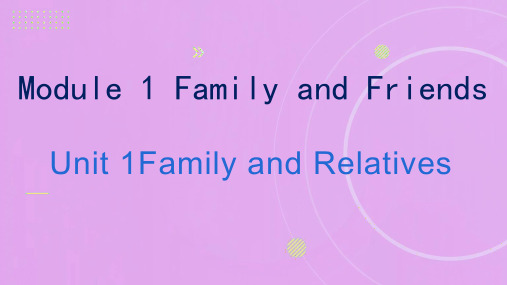
Listen and answer
Question number 1: He is my father’s brother. Who’s he? He’s your uncle.
Question number 2: She’s my father’s niece. Who’s
she? Question number 3: He’s my mother’s father. Who’s he?
Module 1 Family and Friends
Unit 1Family and Relatives
Look and learn
My name is Alice. These are my family and relatives. This is my grandfather. This is my grandmother. This is my mother. This is my father. This is my brother. This is my aunt. These are my uncles. These are my cousins.
Are they your …?
Yes, they are. This is my…. This is my …. These are … and this is …. These are ….
I have two uncles. How many uncles do you have?
I have one uncle.
only /ˈəʊnli /
I only have one aunt. How
many aunts do you have?
I have one aunt, too.
上海牛津版六年级英语上册Unit1知识点详解归纳
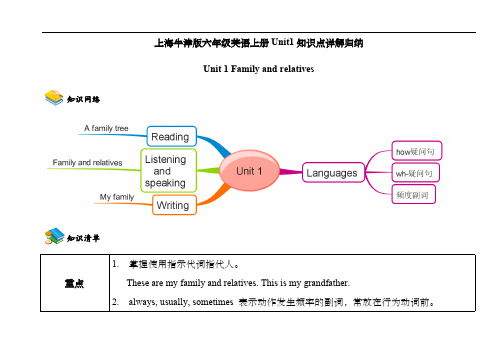
【解析】What else 意为“还有什么”。句意为“你还有什么想要说的?”
【答案】B
例 4.(★★)This is a phone ______ my classmate and me.
A. for
B. in
C. of
D. at
【考点】介词
【解析】句意为“这是我和同班同学的照片。”无生命物质的所属关系可用 of 介词表达。
牛津词汇 relative family tree granddaughter grandson only member *classmate
n.亲戚;亲属 家谱 n.孙女;外孙女 n.孙子;外孙 adv.仅仅 n.成员;会员 n.同班同学
shop go shopping else *badminton cycle go cycling
知识网络
上海牛津版六年级英语上册 Unit1 知识点详解归纳 Unit 1 Family and relatives
知识清单
重点
1. 掌握使用指示代词指代人。 These are my family and relatives. This is my grandfather.
2. always, usually, sometimes 表示动作发生频率的副词,常放在行为动词前。
This picture 这幅图片 = this picture here These flowers 这些花 = these flowers here
3. - How many uncles do you have? 你有几个叔叔? - I have one uncle. 我有一个叔叔。
【比较】have,has 在表示“有”时的用法:
【答案】C
上海牛津英语六年级(上)m1u2教师笔记

上海牛津英语六年级(上)M1U2教师笔记一、学习目标1. 理解并能正确朗读单词和短语:- school, new, classroom, teacher, grade, are, in- How are you? I’m fine, thank you.2. 能听懂、理解并会表达以下句子:- How are you? I’m fine, thank you.3. 掌握并能正确使用语法:- How are you? I’m fine.4. 掌握并能正确使用交际用语:- How are you? I’m fine, thank you.二、教学重难点1. 重点:单词、短语、句子、语法及交际用语的学习与运用。
2. 难点:正确使用How are you? I’m fine, thank you.句型进行日常交流。
三、教学准备1. 课件:针对单词、短语、句子、语法及交际用语的PPT,图文并茂,生动有趣。
2. 教具:幻灯片、多媒体播放设备,教师用黑板并准备书写工具。
3. 材料:教材《上海牛津英语六年级(上)》M1U2课文,学生练习册及作业本。
四、教学过程1. 创设情景引入新课,激发学生学习兴趣。
通过课件或故事情节引入,向学生展示新词汇、句型及表达方式。
2. 学生词汇认读练习。
师生互动,学生认读单词、短语及句子,教师及时纠正发音错误。
3. 同学互动练习。
学生之间进行交际练习,学生用How are you?I’m fine, thank you.进行问候交流。
4. 听力训练。
播放录音或实地对话,要求学生听懂并跟读。
5. 句型训练。
教师引导学生进行句型操练,包括肢体语言的配合,使学生更好地掌握句型的使用。
6. 情景模拟练习。
教师设计情景对话,让学生在真实情境中进行问候交流,并引导学生进行角色扮演。
7. 综合训练。
教师布置相关练习作业,包括课本练习、听力练习及口语练习。
8. 课堂小结。
回顾本节课的学习内容,巩固学生对新知识的理解和掌握。
牛津沪教版英语六上Unit1-Unit12全册课件-附教案

欢
迎
下
载
同步习题
提示:双击打开后可根据需要进行编辑,打印,保存。
欢
迎
下
载
Unit 1 Growing up
Look at the picture
Look and say
Sally was a baby. She was about two months old. She was small and cute.
She is 14 years old now. She goes to junior high school. She is tall and pretty. Her hair is long.
She was 8 years old. Her hair was long. She was very pretty.
One who fails to reach the Great Wall is not a true man. 不到长城非好汉。
museum
palaces
the Palace Museum
The Palace Museum is the head of the world’s top five palaces. It took 14 years to build. It is very big. It measures 961 meters from north to south and 753 meters from east to west. It has four gates and three famous halls. It is the home of many treasures.
Where did you go? What did you do? How was your summer holiday?
牛津沪教版英语六年级上册Unit1-Unit12全册课件-附教案

Discussion
上海教育出版社 六年级| 上册
What have we learned in this class?
上海教育出版社 六年级| 上册
Summary
Show time. Some language points. 1. on one’s mind.
2. be worried about(doing).
3. Growing up is hard.
上海教育出版社 六年级| 上册
Summary
Show time. Some language points. 4. You have been happy since I first met you.
5. wake sb up.
6. learn that way.
Teaching aims
上海教育出版社 六年级| 上册
1. To revise vocabulary and expressions to describe "Our neighbours". 2. To guess meaning from context. 3. The students are able to use the key words correctly.
What comes into your mind when talking about “growing up”?
上海教育出版社 六年级| 上册
Presentation
Learn T: Do you feel happy to grow up?
Do you want to grow up?
上海教育出版社 六年级| 上册
上海教育出版社 六年级| 上册
Part B
牛津上海版英语六年级上册Module 1 Unit 2 Mysummerholiday 第二课时课件

A.spends
B.spent
C.spend
(C )3.My holiday was bad. I _______the bad weather.
A.liked
B.enjoyed C.hated
(C )4.During the summer holiday, Jill ________with her
parents.
A.stay
B.stayd
C.stayed
(B )5.She _______apples with her grandmother in
summer holiday.
A.pick
B.picked
C.pickd
SSummmmaarryy
1.学习了下列单词和短语: spend, everyone, countryside, pick
Hi Kitty, I am having a good time in __B_e_ij_in_g__. I came here by __p_la_n_e__last Sunday. I visited _t_h_e_G_r_e_a_t_W__a_ll__. Tian’ anmen Square and _t_h_e_P_a_l_ac_e__ _M_u_s_e_u_m___.
During the summer holiday, Jill stayed with her grandparents in the countryside. She picked apples with her grandmother.
Language points
1. She enjoyed her summer holiday. 含义:她暑假玩得很开心。 此句用来描述某人某时玩得很开心,其中enjoy 意为“欣赏,享受;喜爱;使过得愉快”。 拓展:enjoy oneself过得愉快;enjoy doing sth喜欢做某事。
- 1、下载文档前请自行甄别文档内容的完整性,平台不提供额外的编辑、内容补充、找答案等附加服务。
- 2、"仅部分预览"的文档,不可在线预览部分如存在完整性等问题,可反馈申请退款(可完整预览的文档不适用该条件!)。
- 3、如文档侵犯您的权益,请联系客服反馈,我们会尽快为您处理(人工客服工作时间:9:00-18:30)。
1.Alice has got a lot of presents and birthday cards from her family and relatives.(1)...have got... I think I have got one.现在完成时结构have got在口语中相当于一般现在时have的意义,表示“有”。
不过,在美国英语中常用have,而在英国英语中则常用have got。
他有一个兄弟。
He has got a brother.(英式)=He has a brother.(美式)◆现在完成时结构只有一种疑问方式,即:Have/Has...got...?◆而一般现在时结构有两种疑问方式,即:Do/Does...have...?或Have /Has...?你有一把雨伞吗?①Have you got an umbrella?②Do you have an umbrella?③Have you an umbrella?注意这两种结构疑问句的回答略有不同。
①—Have you got a dictionary?—Yes,I have./No,I haven't.②—Do you have a dictionary?—Yes,I do./No,Idon't.考点链接1.Do you have a motorbike?(同义句)→you a motorbike?2.I don't have a mobile phone like that.→I a mobile phone like that.(2) a lot of = lots of +可数名词复数/不可数名词I have a lot of friends.= I have lots of friends.There is a lot of water in the glass . = There is lots of water in the glass.(3) 介词from2.How many uncles do you have?How many+可数名词复数+do/does+主语+have(how many在句首,名词复数跟着走)How many的用法:1)there be句型中主语的数量,如some,five,only one等提问时,如果是可数名词,不管是单是复都当复,因为说话人不知道具体的数量,而many只能接可数名词复数,所以be一定要用areHow many+可数名词复数+are there+地点或时间状语There is a book on the desk. How many books are there on the desk?There are seven days in a week. How many days are there in a week? How much的用法:1)询问事物的数量,接不可数名词How much milk is there in the glass2)询问事物的重量How much does the pig weigh?3)多少钱How much is the eraser?4)询问数字计算的结果,相当于what. How much is three plus one?1. ____________ meat do you eat every week?2. ____________ students are there in your class?3.________ the pants? They’re 15 yuan.A.How many is B.How many are C.How much is D.How much are3.I usually go shopping with my aunt.(1) always 总是usually 通常often 经常sometimes有时候never从不表示频率,在句中可看做是插入语。
Eg: He always does his homework carefully.I often go to my grandmother’s house in the weekends.(2) go + V-ing 去做某事go shopping 去购物go cycling 去骑车Go swimming 去游泳(3) with sb 和某人一起。
with后接人称代词时,用宾格形式with用法归纳➢“用……”表示使用工具,手段等。
例如:①We can walk with our legs and feet. 我们用腿脚行走。
②He writes with a pencil. 他用铅笔写。
➢“和……在一起”,表示伴随。
例如:①Can you go to the park with me? 你能和我一起去公园吗?②He often goes to the library with Jenny. 他常和詹妮一起去图书馆。
③She lives with her son. 她和儿子住在一起。
➢“与……”。
例如:I’d like to have a talk with you. 我很想和你说句话。
➢“关于,对于”,表示一种关系或适应范围。
例如:What’s wrong with your watch? 你的手表怎么了?➢“带有,具有”。
例如:①He’s a tall kid with short hair. 他是个长着一头短发的高个子小孩。
②They have no money with them. 他们没带钱。
➢“在……方面”。
例如:Kate helps me with my English. 凯特帮我学英语。
4.—— Have you been to Ocean Park yet?——Yes, I have already/just been to…/been there.No, I haven’t been to…/been there yet.already,just多用于肯定句中,ever,yet,never多用于疑问句和否定句中。
➢.already意思是“已经”①通常用于陈述句中(放在have和has的后面)②也可用于疑问句,表示期望得到肯定的回答或表示惊异,此时already常在句末。
She has already found her bike. Has she found her bike already?她已经找到自行车了?➢yet用法①yet可用于否定句,此时译为“还”;I haven’t found my ruler yet.②也可以用于疑问句,译为“已经”(放在have和has的后面也可放在句末)Have you found your ruler yet?你已经找到尺子了吗?➢just只用于陈述句意思是“刚才”(放在have和has的后面)I have just received a letter.➢never用于否定句译为“从不”(放在have和has的后面)I’ve never been to Beijing.➢ever用于疑问句译曾经”(放在have,has的后面)Have you ever been to Beijing? 练习:根据汉语提示用适当词的合适形式填空。
1.I have __________ finished my homework.我已经做完家庭作业了。
2.He ______________ had his meal.他刚吃过饭。
3. _________ you ________ sung this English song?你曾唱过这首英文歌吗?4.They __________ started _________ .他们还没有动身。
5.We ____________ heard of it.我们从来没有听说过这件事。
6. The plane ______________ arrived . 飞机已经来了。
7. I ______________ been to the post office. 我刚才去邮局了。
8. Mary _______________ been to the Great Wall. 玛丽从未去过长城。
have been to 来过,去过(人已经回来了)have gone to 去或到某地了(人还没回来)注意:遇到四个地点副词时,去掉to (here, there, home, abroad)练习:用have been to,have gone to 填空1)Where is Jim? He ______________ to Beijing.2) She has ________ to the park.She will be back in two hours.3) I have ________ to the West Lake. Look, I have taken many photos on it.4) The Whites have _______ to the USA.They won’t come back.5) I have ______ to Hong Kong twice.6) Tom has ______ to the WC, so I have to wait for him.7) How many times have you _______ to Shanghai.8) I like the Great Wall, so I have ______ there many times this month.9) Sally isn’t at home, she has ________ to Japan.10) The Blacks ar en’t in Shanghai. They have ________ to Beijing together.短语:1. go shopping with my aunt 和我的阿姨去购物2.help each other 互相帮助3. be friendly to sb.对某人友好= be kind to sb4. be late for 迟到5. get angry 生气6.share her food with me 和我一起分享她的食物7.live in 住在8.ask sb about sth 询问某人关于某事ask sb to do sth 让某人做某事ask sb not to do sth 让某人不要做某事tell sb to do sth 告诉某人做某事tell sb not to do sth 告诉某人不要做某事promise to do sth 承诺做某事promise not to do sth 承诺不做某事9.What about (= how about)怎么样(加doing)10.talk about 谈论talk with sb 和某人谈话,talk to sb.和某人谈话11. keep the environment clean 保持环境干净12.look after 照顾(= take care of )13.discuss it with your classmates 和你的同学讨论。
